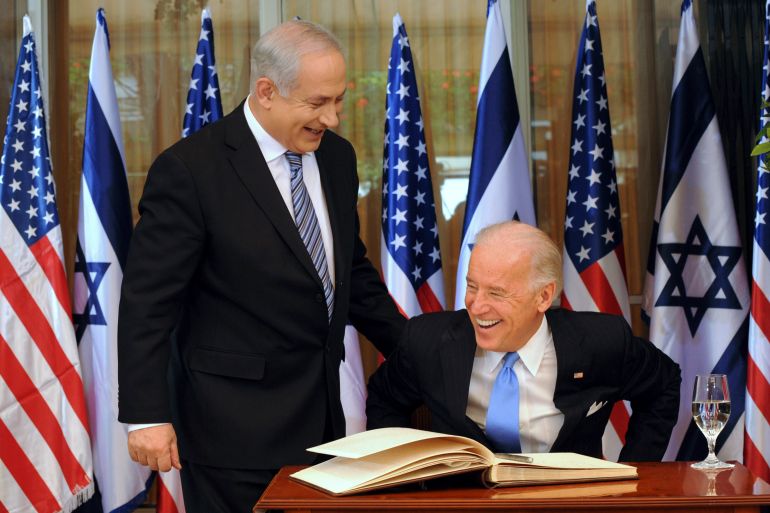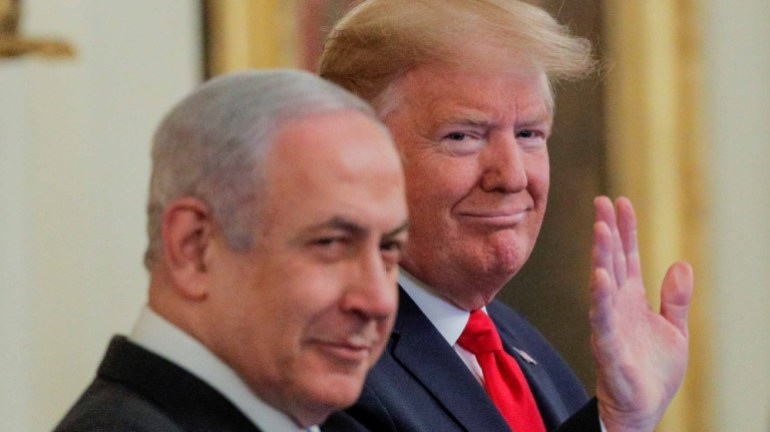Biden and Netanyahu have first call after delay
US president and Israeli PM discussed regional issues, including Iran and recent diplomatic normalisation deals.

Joe Biden had his first official phone call with Benjamin Netanyahu, the White House confirmed on Wednesday after questions swirled over whether the United States president was trying to send a message to the Israeli prime minister by delaying the call.
Biden told White House pool reporters he had a “good conversation” with Netanyahu on Wednesday.
Keep reading
list of 3 itemsIsrael approves first West Bank settler homes since Gulf deals
Progressive Democrats push for changes to US Israel policies
It was Biden’s first call to a Middle East leader since he took office on January 20, signalling the importance of the US-Israel relationship, which has been strong for decades but was significantly bolstered by former President Donald Trump – a staunch Netanyahu ally.
Biden and Netanyahu “discussed the importance of continued close consultation on regional security issues, including Iran”, the White House said in a statement about the call.
“The President emphasized US support for the recent normalization of relations between Israel and countries in the Arab and Muslim world. He underscored the importance of working to advance peace throughout the region, including between Israelis and Palestinians.”
Prime Minister Benjamin Netanyahu spoke this evening with US President @JoeBiden. The conversation was very warm and friendly and continued for approximately one hour. pic.twitter.com/AF3x6aTM36
— PM of Israel (@IsraeliPM) February 17, 2021
Biden has spoken with a number of world leaders since becoming president, including Canadian Prime Minister Justin Trudeau, UK Prime Minister Boris Johnson, Russian President Vladimir Putin and Chinese President Xi Jinping.
Aaron David Miller, a senior fellow at the Carnegie Endowment for International Peace, said the US president intended to send a message by holding his call with Netanyahu only nearly one month after he took office.
“The message is: ‘I am pro-Israel – a stunningly pro-Israel president – but I’m not necessarily pro-Netanyahu’,” Miller told Al Jazeera.
“Biden was not going to borrow a page from Trump’s playbook and give Netanyahu a warm embrace weeks before an Israeli election,” he said, referring to legislative polls in Israel that will be held on March 23.
Netanyahu’s office lauded the call, however, saying “the conversation was very warm and friendly and continued for approximately one hour”.
“The two leaders noted their longstanding personal connection and said that they would work together to continue strengthening the steadfast alliance between Israel and the US,” it said.

One point of departure between Biden and Netanyahu is the new administration’s stated intent to resurrect the Iran nuclear deal, which Netanyahu had vehemently opposed and from which Trump unilaterally withdrew in 2018.
Biden has pledged to rejoin the agreement if Iran returns to compliance with restrictions on its uranium enrichment capabilities.
Biden and Netanyahu “discussed the future advancement of the peace accords, the Iranian threat and regional challenges, and agreed to continue their dialogue”, the statement from Netanyahu’s office said.
While Biden has pledged to reinstate US diplomatic relations with the Palestinian Authority (PA) and restore US aid for Palestinians, his administration has signalled its refusal to reverse some of Trump’s most divisive policies on the conflict.
US Secretary of State Antony Blinken said the Biden administration would not seek to reverse Trump’s move of the US embassy to Jerusalem – a move that was denounced by Palestinians and international observers.
Biden has also given his broad support to the so-called Abraham Accords – diplomatic normalisation agreements brokered by Trump’s administration between Israel and Bahrain, the United Arab Emirates, Sudan, and Morocco that Palestinians have rejected as a “stab in the back“.
Biden’s administration has said it would examine the US commitments made as part of the deals, however.
Meanwhile, Netanyahu’s office said in its statement that Biden commended the Israeli premier on efforts to combat the coronavirus and said the two exchanged ideas on ways to deal with the pandemic.
Israel has been criticised for failing to share its COVID-19 vaccine stock with Palestinians living in the Israeli-occupied West Bank and Gaza Strip.
This week, the PA accused Israel of blocking a shipment of vaccines intended for health workers in Gaza. The shipment reached the blockaded Palestinian territory on Wednesday.